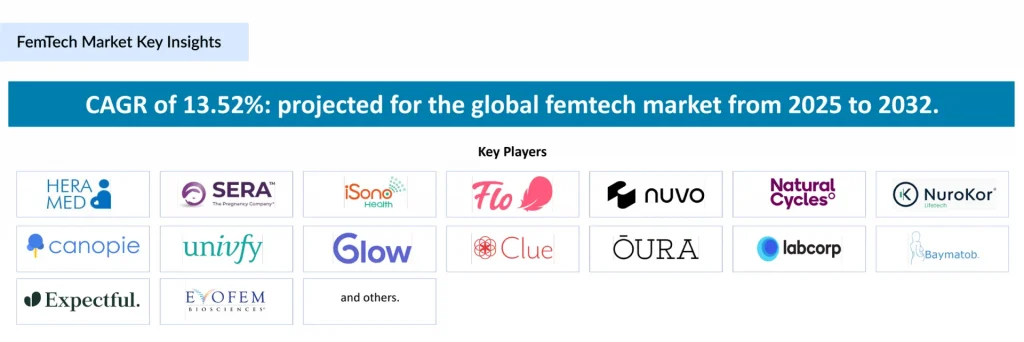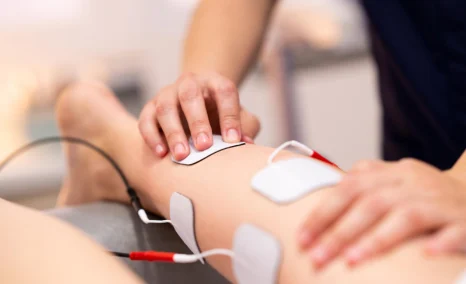Unlocking the Future of Women’s Healthcare Market: The Promise of FemTech
Aug 09, 2025
Table of Contents
FemTech, short for “Female Technology,” is a rapidly growing sector in healthcare that focuses on leveraging digital tools like mobile apps, wearables, diagnostics, and telehealth to address women’s health needs. Coined by entrepreneur Ida Tin in 2016, the term captures a movement that began with menstrual tracking apps and has since expanded into areas like fertility, pregnancy, menopause, sexual wellness, and chronic conditions such as endometriosis and osteoporosis. What makes FemTech unique is its data-driven, personalized approach to previously underserved or stigmatized women’s health issues.
The evolution of FemTech is closely tied to advancements in biotechnology, AI, and digital health, enabling innovations like predictive analytics, smart wearable monitors, and remote diagnostics. Apps like Bellabeat and Clue exemplify how women now use technology to monitor menstrual cycles, track fertility, manage symptoms such as aches under the right breast, and gain real-time insights into their overall health.
Downloads
Click Here To Get the Article in PDF
Recent Articles
- Wearables 2.0: The Next Wave of Clinical-Grade Wearable Medical Devices
- Rapid Medical’s TIGERTRIEVER 13; Glaukos’s Istent Infinite System; GE Healthcare’s Definium 656 H...
- Cancer Diagnostic Market: Evaluating the Major Growth Factors and the Key Developments in the Domain
- Neuromodulation Devices Observed to Reshape the Migraine Treatment Dynamics
- Boston Scientific’s WATCHMAN FLX™ Pro; Quest Diagnostics’s AAV Test; Vitestro Started A.D.O.P.T. ...
FemTech also plays a vital societal role by closing long-standing gender gaps in healthcare research, funding, and care delivery. It empowers women to take control of their health journeys while encouraging open conversations around taboo subjects like sexual health and menstrual pain. As investor interest and consumer demand continue to grow, FemTech is transitioning from a niche category to a central pillar of modern healthcar,e making it more inclusive, personalized, and responsive to the biological realities of women’s lives.
Key Areas Where FemTech is Transforming Women’s Healthcare
By combining medical science with advanced technology, FemTech apps and FemTech products are empowering women to monitor, understand, and manage their health in a personalized and proactive way. The FemTech market is not only growing rapidly but also evolving to meet the diverse needs of women across different life stages. Below are the key areas where FemTech is making the most significant impact.
Menstrual Health and Cycle Tracking
Menstrual tracking is a key driver of growth in the FemTech market, acting as an entry point for users and enabling broader women’s health innovations. According to the data provided by the World Health Organization (2024), millions around the world are unaware or unprepared for menstruation before having their first period. By logging menstrual cycles, ovulation, symptoms, and emotional changes, apps offer insights into reproductive health and well-being. Platforms like Flo, Clue, and Natural Cycles use AI for accurate forecasts and symptom analysis. As more women adopt these tools to detect conditions like PCOS or endometriosis, demand rises for personalized, tech-enabled solutions. Wearables like Bellabeat IVY and the Oura Ring further enhance tracking through real-time data, boosting accuracy and engagement.
For Instance, In October 2024, Oura launched its enhanced Cycle Insights, leveraging continuous biometric data like skin temperature, heart rate variability, and respiratory rate to track menstrual cycle phases more accurately. The update includes Fertile Window prediction and deeper insights into perimenopause, pregnancy detection, sleep disruptions, and stress patterns.
Fertility and Pregnancy Support
Fertility and pregnancy support significantly drive FemTech market growth by offering personalized reproductive health solutions. According to WHO (2024), about one in six people of reproductive age worldwide face infertility. With rising infertility and delayed parenthood, apps like Natural Cycles and Ovia help track fertility, while wearables like Ava and Bellabeat offer accurate ovulation data. Tools like Modern Fertility and Kindbody provide at-home tests and digital clinics, and Nuvo’s INVU supports remote prenatal care, enhancing access, outcomes, and investment in FemTech.
For Instance: In September 2021, the FDA cleared Mira’s Progesterone (PdG) Confirm Wand, the first FDA-approved at-home test to confirm ovulation by measuring pregnanediol glucuronide. It offers more accurate fertility insights than LH strip tests, aiding infertility care and reproductive planning.
Sexual and Reproductive Health
Sexual and reproductive health is a vital part of FemTech, covering contraception, STI prevention, and sexual wellness. According to WHO (2024), about six out of 10 unintended pregnancies end in induced abortion. Apps like Nurx and The Pill Club offer birth control access and STI kits, while Ferly and Rosy support sexual wellness and trauma recovery, empowering users with private, stigma-free care.
For Instance: In March 2025, Femasys received the CE mark under EU MDR for its FemBloc® non‑surgical permanent birth control system, the first-ever in-office polymer-based tubal occlusion device.
Postpartum and Breastfeeding Care
Postpartum and breastfeeding care are rising segments in FemTech, supporting recovery, mental health, and lactation. Companies like Maven Clinic, Mahmee, Glow Baby, Elvie, Willow, and Bellabeat offer smart tools for postpartum care. Some users note tenderness under the right breast with Bellabeat, highlighting a need for better guidance. According to WHO, around 10% of pregnant women and 13% of new mothers globally face mental disorders, mainly depression, higher in developing countries at 15.6% during pregnancy and 19.8% post-birth. FemTech offers screenings, exercise plans, and teleconsultations to aid maternal well-being.
For Instance: In October 2024, Myri Health introduced new AI-driven enhancements to its maternal care app, offering personalized support from pregnancy through postpartum recovery.
Chronic Conditions and Autoimmune Disorders
FemTech is revolutionizing care for chronic and autoimmune conditions like endometriosis, PCOS, thyroid disorders, and lupus often undiagnosed in women. Apps like MyEndometriosisTeam and PCOS Tracker support symptom tracking, while Everlywell offers at-home hormone testing. With AI insights and remote monitoring, these tools aid early diagnosis and personalized care, enhancing women’s quality of life and fueling growth in gender-specific chronic care solutions.
For Instance: In April 2025, Australia launched the CHARLI App for endometriosis & reproductive health. CHARLI is an AI-powered mobile app developed in partnership with Endometriosis Australia. It helps users track menstrual cycles, pain, fertility, pregnancy, menopause, and reproductive-related conditions especially endometriosis and PCOS.
Digital Therapeutics and Telehealth
Digital therapeutics and telehealth are boosting FemTech by offering accessible, personalized care for women’s health. Apps like Bloom and Wysa address PMS, PCOS, and anxiety, while platforms like Maven Clinic and Nurx provide virtual care for fertility, contraception, and menopause. These solutions reduce stigma, enable remote monitoring, and improve outcomes, driving investment and market growth.
For Instance: In July 2025, Solence launched AI-powered digital therapeutic for PCOS.
FemTech Key Products and Applications
FemTech (Female Technology) refers to digital health software, devices, services, and products that use technology to address biological and health needs unique to women. These solutions range from menstrual tracking apps and fertility monitors to pelvic health devices and menopause support platforms.
Types of FemTech Products
| Category | Product Types | Examples | Applications |
| Mobile Applications (Apps) | Menstrual tracking, fertility prediction, pregnancy monitoring, sexual wellness | Clue, Flo, Natural Cycles, Glow | Support menstrual tracking, fertility planning, pregnancy monitoring, menopause management, sexual wellness, and chronic condition tracking (like PCOS or endometriosis). They offer personalized insights, reminders, telehealth access, and symptom logging. |
| Wearables & Smart Devices | Fertility tracking wearables, pregnancy monitors, breast pumps, pelvic trainers | Ava bracelet, Elvie Trainer, Willow Pump | Track biometric data such as heart rate, skin temperature, sleep, and ovulation to support menstrual health, fertility, pregnancy, postpartum recovery, and menopause. |
| Diagnostic Devices & Kits | At-home fertility/ovulation kits, hormone level monitors, and infection test kits | Mira, Modern Fertility, LetsGetChecked | Enable at-home testing for fertility hormones, STIs, and hormonal imbalances. |
| Therapeutic Devices | Pelvic floor exercisers, vaginal rejuvenation lasers, and pain relief devices | Elvie, Joylux vFit, Livia | Therapeutic devices address issues like menstrual pain, pelvic floor disorders, and postpartum recovery. |
| Telehealth & Digital Platforms | Online consultations, AI-powered health coaches, therapy, prescription platforms | Maven Clinic, Tia, Nurx | Offers remote access to services like fertility support, contraception, pregnancy care, and mental health. |
| Pharmaceuticals & Supplements | Hormonal therapies, reproductive health supplements, and menopause-related medication | Bonafide, Kindbody, Progyny | Support hormonal balance, fertility, menstrual health, and menopause relief. |
| Reproductive Health Products | IVF tools, egg freezing services, contraceptives (including digital and hormonal) | Oova, Clue Birth Control, Natural Cycles | Empower users with data-driven insights, aiding in family planning, conception, and menstrual health management. |
| Mental Health & Wellness Tools | Mindfulness apps, therapy platforms, and postpartum depression management | Woebot Health, BetterHelp (Women-specific therapy) | Offers support for anxiety, depression, postpartum mood disorders, and emotional well-being through apps, guided therapy, meditation, and virtual counseling. |
| Menopause Support Products | Smart cooling wearables, symptom tracking apps, hormone replacement therapy tools | Embr Wave, Lisa Health | Help manage symptoms like hot flashes, sleep disturbances, and mood swings. Offers personalized guidance, hormone tracking, and lifestyle support. |
| Maternal & Postpartum Care | Breastfeeding apps, lactation devices, postpartum health tracking tools | Willow, Elvie, Glow Baby | Supports recovery, emotional well-being, lactation, and newborn care. |
Regulatory and Ethical Considerations in FemTech
As FemTech innovations continue to expand globally, ranging from mobile health apps and wearables to diagnostics and reproductive technologie,s regulatory and ethical frameworks are vital to ensure product safety, efficacy, data integrity, and user trust. These considerations span international borders, requiring alignment with medical device regulations, digital health policies, clinical trial standards, and data privacy laws such as GDPR (Europe), HIPAA (U.S.), and other region-specific mandates.
| Function Area | Global Role in FemTech | Impact/Examples |
| Regulatory Oversight | Governments and agencies like the U.S. FDA, European Medicines Agency (EMA), and Japan’s PMDA regulate FemTech as medical devices, diagnostics, or digital health solutions. | – FDA cleared Natural Cycles as a digital contraceptive- EMA regulates menstrual tracking apps and fertility monitors as Class IIa devices |
| Ethical and Data Privacy Standards | FemTech products handling sensitive health and reproductive data must comply with global data protection laws like GDPR, HIPAA, and PIPEDA. | – Smart breast pumps, fertility apps, and wearables are expected to have built-in data encryption and informed consent protocols. |
| Digital Health & AI Guidance | Agencies provide evolving frameworks for SaMD (Software as a Medical Device), AI algorithms, cybersecurity, and mobile medical applications. | – FDA and EMA issue guidelines for clinical decision support systems.- Emphasis on explainability and bias reduction in AI-driven hormone tracking tools. |
| Global Innovation Support Programs | Regulatory bodies run fast-track programs to accelerate market entry of safe and effective innovations. | – FDA’s Breakthrough Devices Program: supports infertility diagnostics.- UK’s MHRA and EU MDR offer conditional approvals for digital health pilots. |
| Clinical Trial Oversight | Ethical boards and regulators demand inclusive clinical trials with sex-specific safety and efficacy data, ensuring diverse representation of women. | – Required inclusion of female data in studies on hormonal therapies, menopause, and autoimmune conditions. |
| Real-World Evidence (RWE) | Regulators increasingly rely on real-world data (RWD) from FemTech platforms for post-market surveillance and performance tracking. | – Cycle tracking apps and wearables collect RWD used in safety evaluations and regulatory decisions. |
| Device Software Evaluation | Based on intended use and risk class, digital tools are reviewed for algorithm validation, reliability, and clinical relevance. | – AI-based ovulation predictors and period pain management tools undergo software risk assessment. |
| Security and Ethical Use | Ethical frameworks ensure transparent use of health data, promote informed consent, and prevent misuse or discrimination based on reproductive data. | – Guidelines mandate clarity in data-sharing practices and opt-in models for personalized marketing. |
| Public Health Education & Literacy | Organizations like WHO, FDA’s OWH, and nonprofits promote safe use of FemTech through awareness campaigns and toolkits. | – Webinars, toolkits, and digital literacy resources help users understand approved and regulated FemTech options. |
| Interagency & Industry Collaboration | Cross-border cooperation among regulators, academia, and industry ensures harmonized standards and fosters innovation. | – Joint task forces between NIH, EMA, FDA, and global FemTech companies are shaping best practices and compliance strategies. |
Market Size and Emerging Region in FemTech
The global FemTech (female technology) market is estimated to grow at a CAGR of 13.58% during the forecast period from 2025 to 2032. Key market drivers include:
- Increasing awareness and demand for women’s health solutions.
- Rise in chronic and reproductive health conditions among women.
- Technological advancements in digital health platforms, wearables, and diagnostics.
In 2024, North America dominated the global FemTech market, owing to strong investments in women-centric startups, supportive healthcare policies, and widespread adoption of mobile health (mHealth) solutions. Government and private initiatives are playing a key role in addressing women’s unmet healthcare needs through innovation and funding.
Meanwhile, Europe and Asia-Pacific are emerging as high-potential regions, driven by growing digital literacy among women, rising focus on maternal health, and improved access to telehealth. The Asia-Pacific region, in particular, is witnessing increasing startup activity and cross-border collaborations in fertility tracking, menstrual care, and pregnancy monitoring.
From a product perspective, the market is expanding across sectors such as fertility solutions, pregnancy & nursing care, menstrual health, menopause support, and chronic condition management. Wearable devices, mobile apps, and AI-powered diagnostics are central to this growth, reflecting a strategic global push toward personalized, preventive, and data-driven women’s health technologies.
FemTech Market Dynamics

Market Drivers
- Increasing Awareness of Women’s Health Needs: Growing awareness around menstrual hygiene, fertility, menopause, and mental health has led to greater demand for female-focused technologies. Social media, education, and advocacy movements have played a pivotal role in removing stigmas and encouraging more open conversations around women’s health.
- Rise in Chronic and Reproductive Health Conditions: The increasing prevalence of conditions like endometriosis, PCOS (polycystic ovary syndrome), infertility, and breast cancer has driven the need for advanced, accessible, and patient-centric health solutions. According to the data provided by the World Health Organization (2025), polycystic ovary syndrome (PCOS) affected an estimated 6–13% of reproductive-aged women. FemTech addresses these gaps through remote monitoring, predictive tools, and digital health services.
- Technological Advancement in Digital Health: Rapid innovation in AI, machine learning, wearables, and mobile health applications is transforming how healthcare is delivered to women. Smart wearables (e.g., Bellabeat, Elvie), fertility trackers, and telehealth platforms (e.g., Maven Clinic, Clue) are creating personalized and proactive care environments.
Market Restraints
- Data Privacy and Security Concerns: FemTech applications often collect sensitive health data. Issues around HIPAA compliance, data breaches, and user mistrust can restrict adoption, especially in regions with weak digital regulations.
- Limited Access in Developing Countries: Despite its global potential, FemTech adoption remains low in low-income countries due to a lack of digital infrastructure, internet access, and cultural barriers around women’s health topics.
Investment and Funding Trends in FemTech
FemTech continues to attract significant venture activity, especially in fertility, hormone health, diagnostics, and menopause care, with investments indicating strong confidence in its potential growth and impact.
March 2025
- Ataraxis AI closed $20.4 million Series A for AI breast cancer diagnostics.
- Afynia raised $5 million for its EndomiR blood test for endometriosis.
- Wingwomen Technologies specifically raised $2 million after winning the FemTech Product of the Year award in Dubai, to develop its AI-powered digital speculum “NINA”.
February 2025
- Epicore raised $26 million to advance wearable sweat-sensing for women’s health.
- Level Zero Health secured $6.9 million to develop hormone testing via wearable patches.
- Snuggs raised €5 million for the expansion of its period underwear brand.
January 2025
- Gesynta Pharma secured $29 million in Series B funding to advance its non-hormonal endometriosis treatment, vipoglanstat, through a Phase II clinical trial.
- Allara Health, a virtual care platform focused on women’s hormonal health, has secured $26 million in Series B funding.
- Kegg (Lady Technologies) obtained $6.5 million Series A for vaginal health solutions.
- Ema (AI-powered women’s health platform) raised $3 million in seed funding.
Recent Developments Shaping the Future Outlook of the FemTech Market
| Company Name | Approval/Launch Year | Product/Device | Description & Significance |
| Breast Cancer Research Foundation (BCRF), Clairity, Inc. | June, 2025 | Clairity Breast | It is an AI-powered platform that predicts a woman’s risk of developing breast cancer over the next five years using only a standard mammogram. |
| Teal Health, Inc. | May, 2025 | Teal Wand | It is an at-home vaginal sample self-collection device for cervical cancer screening in the United States. |
| Matri | May, 2025 | Matri Pro Dual‑Connectivity | It is India’s dual‑mode menstrual pain relief wearable. |
| Samphire Neuroscience | May, 2025 | Nettle | It is a headband-style wearable using transcranial direct current stimulation (tDCS), aims to alleviate pain, anxiety, and mood changes associated with menstruation and PMDD. |
| Visby Medical, Inc. | March, 2025 | Visby Medical™ OTC PCR Test for Sexual Health | It provides results directly to users within 30 minutes, utilizing real PCR technology, which is recognized as the gold standard in diagnostic accuracy. |
| Sebela Pharmaceuticals Inc. | February, 2025 | MIUDELLA® (copper intrauterine system) | It is for the prevention of pregnancy in females of reproductive potential for up to three years. MIUDELLA is a next-generation, hormone-free, low-dose copper intrauterine device or IUD. |
| Femasys Inc. | February, 2025 | FemaSeed® | It is the intratubal insemination product for female infertility treatment. |
| Sonio SAS | February, 2025 | Sonio Suspect AI | It is designed to enhance prenatal screening with AI-driven anomaly detection and real-time quality control, supporting early and accurate diagnosis. |
| identifyHer | January, 2025 | Peri | A wearable for monitoring perimenopause symptoms (e.g., night sweats, anxiety, mood changes). |
| GE HealthCare | April, 2024 | Voluson Signature 20 and 18 ultrasound systems | It integrates artificial intelligence (AI), advanced tools, and an ergonomic design to speed exam time for clinicians while delivering a clearer picture of various conditions impacting women’s health. |
| Qvin™ | January, 2024 | Q-Pad™ and A1c Test | It is a menstrual blood-based test for monitoring HbA1c levels in individuals with diabetes. |
Leading Startups and MedTech Companies in the FemTech Market
The market has experienced a substantial expansion in recent years as companies are actively engaged in developing new products. Currently, numerous business entities, including well-established MedTech companies and startup,s are actively working in the FemTech market. It is difficult to determine which are the best FemTech companies, as it depends on various factors; however, some of the renowned companies making an immense impact in the market are as follows:
Clue by Biowink GmbH
Focus: Menstrual & fertility tracking
Product: Clue App
Insight: Clue is one of the most widely used cycle tracking apps globally, with FDA clearance for its digital birth control feature (2021). It uses user-entered data and predictive algorithms to help women understand and manage reproductive health.
Flo Health
Focus: Period tracking, fertility, and pregnancy
Product: Flo App
Insight: Over 60 million monthly users. Uses AI to offer health insights tailored to menstruation, ovulation, and emotional health. Collaborates with medical experts and launched privacy-focused modes after data handling controversies.
Elvie
Focus: Maternal health, breastfeeding, pelvic care
Products: Elvie Pump (wearable breast pump), Elvie Trainer
Insight: A pioneer in discreet, silent breast pump tech. Strong market presence in the UK, US, and EU. It has raised over $150 million and partners with health insurers and retailers to improve postpartum tech access.
Natural Cycles
Focus: Contraceptive technology
Product: Natural Cycles App
Insight: First app to be certified as a digital contraceptive by the FDA and CE-marked in Europe. It uses basal body temperature and algorithmic tracking for fertility monitoring. Recently integrated with Oura Ring for passive tracking.
Kindbody
Focus: Fertility & reproductive health clinics
Services: IVF, egg freezing, employer benefits
Insight: A vertically integrated fertility platform blending clinics, telehealth, and employer fertility benefits. Strong B2B play with corporate partnerships (e.g., Walmart). Has expanded via acquisitions (Vios Fertility, PhyMed).
Maven Clinic
Focus: Telehealth for women and families
Services: Fertility, pregnancy, postpartum, menopause, mental health
Insight: One of the world’s highest-valued FemTech startups. Works with employers and payers to deliver comprehensive virtual care. Also launched Maven Wallet for family-building expense tracking.
There are numerous other small, mid, and large-scale companies active in the FemTech market. Apart from the above-mentioned companies, some other market players operating in the FemTech market include HeraMED, Sera Prognostics, iSono Health, Inc., NUVO Inc., Natural Cycles USA Corp, Athena Feminine Technologies, Inc., NUROKOR LIMITED, Canopie, Univfy Inc., Glow Inc., Oura Health Oy., Laboratory Corporation of America® Holdings, Baymatob Operations Pty. Ltd., Expectful, Evofem Biosciences, Inc., March Inc., Syantra Inc., and others. The market is changing quickly, and new businesses with creative solutions and innovative products keep popping up, helping to change the way that women’s healthcare is provided.
Future of FemTech
The future of FemTech (Female Technology) is highly promising and poised to redefine the landscape of women’s health and wellness. Fueled by technological innovation, growing awareness, and shifting societal attitudes toward gender-specific healthcare, the FemTech industry is expanding its reach far beyond period tracking and fertility support.
Expansion beyond Reproductive Health: Traditionally, FemTech focused largely on reproductive health, menstruation, fertility, pregnancy, and menopause. In the future, the scope will broaden to encompass cardiovascular health, autoimmune diseases, mental health, cancer screening, sexual wellness and urogenital health, bone health, and osteoporosis trackin,g among other,s which are more common in women.
AI-Powered & Predictive Healthcare Tools: The integration of Artificial Intelligence (AI) and Machine Learning (ML) is the future core of FemTech applications. These tools will help provide personalized health insights based on cycle patterns, hormonal levels, and lifestyle data. Additionally, predict health risks such as PCOS, endometriosis, or miscarriage. Enable smart alerts for early detection of cancer, cardiovascular issues, or mental health decline and enhance the accuracy of fertility prediction, replacing older calendar-based models.
Precision Medicine & Hormone Mapping: Advances in genomics, epigenetics, and hormonal mapping will create personalized interventions for menstrual irregularities, perimenopausal symptom relief, contraceptive selection based on hormone compatibility, and fertility optimization.
Menopause and Aging-Focused Innovation: A surge in FemTech products dedicated to menopause care, including hormone therapy apps, supplements, cooling wearables, and telehealth platforms is expected to boom.
Integration with Healthcare Systems: FemTech will increasingly be integrated into electronic health records (EHRs) and clinical decision tools. Healthcare providers will rely on FemTech data for diagnosis, early detection, and treatment optimization.
Conclusion
FemTech, short for female technology, has emerged as a transformative force in addressing women’s unique health needs through innovative solutions. From FemTech apps to cutting-edge FemTech products, the sector continues to evolve rapidly with growing user engagement and investment. The FemTech market is witnessing significant growth driven by increasing awareness, personalized care, and digital health adoption. Among key FemTech trends are wearable wellness trackers like Bellabeat, which even address niche concerns such as ache under right breast Bellabeat, pain under right breast Bellabeat, and tender under right breast Bellabeat with discussions surfacing across platforms including bellabeat.com.
Moreover, specialized guidance on intimate health, such as how to deal with herpes on your period, showcases the inclusive nature of modern women’s health app markets. As awareness expands, FemTech companies are offering holistic care across menstruation, fertility, mental health, and chronic disease. The best FemTech companies like Bellabeat, Flo, Clue, and Elvie are not just redefining digital health but empowering women to take control of their well-being through technology.

Downloads
Article in PDF
Recent Articles
- Stryker’s Tornier Shoulder Arthroplasty; Genesis Acquires JC Medical; FDA Clearance to Single-Use...
- Epredia Announced the US Launch of SlideMate Laser; Olympus, Canon Medical Announced Partnership;...
- AI Healthcare Startups: Unveiling Investment and Funding Trends
- ABANZA Secures FDA 510(k) Clearance for WasherCap™ Mini; Cerus Corporation Secures CE Mark for Ne...
- Artificial Intelligence and Machine Learning in Software as a Medical Device (SaMD)



